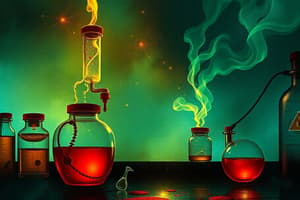Podcast
Questions and Answers
What is the course code for Forensic Chemistry and Toxicology?
What is the course code for Forensic Chemistry and Toxicology?
CRI 023
What are the prerequisites for the Forensic Chemistry and Toxicology course?
What are the prerequisites for the Forensic Chemistry and Toxicology course?
CHE022
Which of the following is NOT an objective of the Forensic Chemistry and Toxicology course?
Which of the following is NOT an objective of the Forensic Chemistry and Toxicology course?
- Recognize standardized tests and laboratory equipment
- Conduct criminal investigations personally (correct)
- Demonstrate protocols for handling evidence
- Explain principles of forensic chemistry
Forensic toxicology is only concerned with the study of poisons.
Forensic toxicology is only concerned with the study of poisons.
The course provides an overview of the major disciplines of forensic chemistry and forensic _____.
The course provides an overview of the major disciplines of forensic chemistry and forensic _____.
What is the maximum number of credit units for the Forensic Chemistry and Toxicology course?
What is the maximum number of credit units for the Forensic Chemistry and Toxicology course?
What is one of the topics addressed in SAS#6?
What is one of the topics addressed in SAS#6?
What week does the First Periodical Examination take place?
What week does the First Periodical Examination take place?
Flashcards are hidden until you start studying
Study Notes
Course Description
- Forensic Chemistry and Toxicology is a 5-unit course.
- The course provides an overview of Forensic Chemistry and Forensic Toxicology.
- The course focuses on their contribution to:
- crime investigation
- identification
- collection
- preservation
- chemical and biological analyses
- presentation of physical evidence
Course Objectives
- Students will understand how Forensic Chemistry and Forensic Toxicology contribute to crime detection and investigation.
- Students will learn how to properly handle chemical and biological evidence.
- Students will identify the different types of standardized tests and laboratory equipment for processing physical evidence.
Course Outline
- Week 1:
- Introduction to Forensic Chemistry.
- History of Forensic Chemistry
- Week 2:
- Collecting physical evidence.
- Collecting trace evidence.
- Proper tagging and labeling of evidence.
- Week 3:
- Identifying different drug types.
- Understanding the law against drug abuse.
- Week 4:
- Defining drug physiology.
- Describing drug tests.
- Understanding specimen tampering.
- Distinguishing between qualitative and quantitative drug specimen analysis.
- Week 5:
- Identifying different types of explosives.
- Understanding the effect of explosions.
- Discussing the characteristics of explosives.
- Describing explosives analysis.
- Week 6:
- Identifying the properties of glass.
- Understanding the theories behind glass fractures.
- Week 7:
- First Periodical Examination
- Week 8:
- History of Toxicology.
- The importance of toxicology.
- Week 9:
- Different types of poisons.
- Understanding poisoning
- Week 10:
- Second Periodical Examination
- Week 11:
- Understanding DNA profiling.
- Applying DNA profiles to criminal investigations.
- Week 12:
- Identification of hair fibers and their applications to criminal investigations.
- Week 13:
- Identification and analysis of soil and its application to criminal investigations.
- Week 14:
- Understanding ballistics.
- Analyzing gunshot residue.
- Week 15:
- Understanding the importance of forensic photography.
- Identifying the uses of forensic photography in crime investigations.
- Week 16:
- Third Periodical Examination
- Week 17:
- Final Examination
Studying That Suits You
Use AI to generate personalized quizzes and flashcards to suit your learning preferences.




